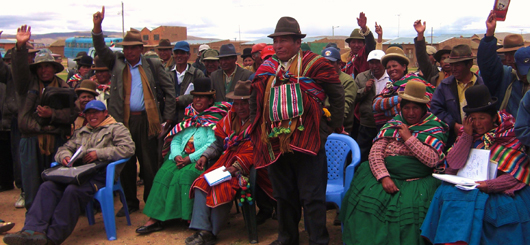Tools
The following is a series of specific tools to promote good governance in certain global areas, grouped according to key principles of good governance, as proposed by the United Nations and other international agencies:
- Citizen participation
- FAO’s Climate, Biodiversity, Land and Water Department proposes the following methodological approaches: 1) "Participatory and Negotiated Territorial Development" (PNTD), intended to promote environments of trust among social actors, reinforcing social cohesion and promoting systemic territorial development; 2) Green Negotiated Territorial Development (GreenNTD) to facilitate equitable access and sustainable territorial management; and 3) “Adaptive Governance,” which is intended to promote international agreements that can generate social capital among small farmers, helping them become key agents in the development of resilient ecosystems, while adapting institutions to serve the resource base.
- Territorial agreements promote synergies between the communities, city governments and institutions of each territory, enabling agreements, negotiation and joint action elements. Using open spaces, the community presents the problems that need to be resolved and then an agreement is proposed and formalized.
- Basic and land tenure rights
- The Voluntary Guidelines to Support the Progressive Realization of the Right to Adequate Food in the Context of National Food Security provide a practical orientation to guide the state’s efforts in order to establish an environment conducive to the population being able to feed themselves in a dignified manner and create adequate safety networks for those who are not in any condition to do so.
- The EU-FAO Improved Global Governance for Hunger Reduction Program has the objective of ensuring better-coordinated global action in terms of food safety and nutrition in addition to supporting the development and implementation of policies, programs and capacities at all levels.
- Voluntary Guidelines on the Responsible Governance of Tenure of Land, Fisheries and Forests in the Context of National Food Security offer principles and practices that governments can refer to when formulating laws and administrating land, fishing and forest rights, intended to help protect said rights.
- Quality of budgetary, financial and public administration management, accountability
- The Municipal Participatory Budget incorporates direct democracy procedures in the annual budget cycle. Through a process of debates and consultations, the citizens decide the amount of income and expenses, as well as when and where investments will be made, what the priorities are, and which plans and actions their leaders should carry out.
- Results-based management to achieve territorial development is a public resources management model focused on complying with the strategic actions defined in the government’s plan for a specific period of time and with specific resources.

